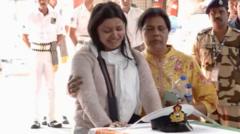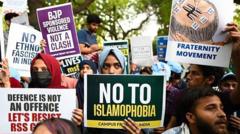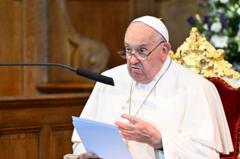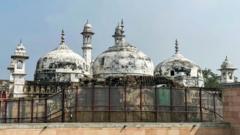In southern India, an intense political debate has emerged surrounding the revered laddu sweet of the Tirupati temple, the richest Hindu pilgrimage site globally. This controversy ignited when the newly elected chief minister, N. Chandrababu Naidu, accused his Christian predecessor of compromising the purity of the temple's offerings by using adulterated ghee containing animal fats in the preparation of laddu. Given that a significant portion of the temple’s priests and devotees adhere to vegetarian customs, Naidu’s claims cast doubt on the sanctity of this long-standing tradition, sparking fierce reactions.
The Tirupati temple, which generates substantial annual revenues and allocates significant funds for ghee procurement—approximately one million dollars monthly—has become a battleground illustrating the growing intersection of food practices and politics in India. Historically rooted in both religious and social traditions, India’s food culture is increasingly scrutinized in the context of political narratives surrounding nationalism and dietary ethics. Cows hold a sacred status in Hinduism, prompting various states to enforce strict anti-cow slaughter laws and regulate the sale and transportation of beef, often leading to violence against marginalized communities.
The politicization of food is amplified by the escalating rise of Hindu nationalism, particularly under Prime Minister Narendra Modi’s administration. Vegetarian activism and cow protection have emerged as key subjects within the political framework, frequently leading to social unrest. The mere allegation of beef consumption can trigger violent retaliations from groups dedicated to enforcing dietary norms.
This recurring theme of food as a source of division harkens back to the Indian Rebellion of 1857, where claims of beef-influenced military provisions incited animosity among soldiers of diverse religions, echoing the contemporary challenges faced by India's multi-faceted populace. The ongoing laddu controversy serves as a reminder that food, deeply embedded in cultural and religious practices, can also reflect and exacerbate the existing divides within Indian society.
The Tirupati temple, which generates substantial annual revenues and allocates significant funds for ghee procurement—approximately one million dollars monthly—has become a battleground illustrating the growing intersection of food practices and politics in India. Historically rooted in both religious and social traditions, India’s food culture is increasingly scrutinized in the context of political narratives surrounding nationalism and dietary ethics. Cows hold a sacred status in Hinduism, prompting various states to enforce strict anti-cow slaughter laws and regulate the sale and transportation of beef, often leading to violence against marginalized communities.
The politicization of food is amplified by the escalating rise of Hindu nationalism, particularly under Prime Minister Narendra Modi’s administration. Vegetarian activism and cow protection have emerged as key subjects within the political framework, frequently leading to social unrest. The mere allegation of beef consumption can trigger violent retaliations from groups dedicated to enforcing dietary norms.
This recurring theme of food as a source of division harkens back to the Indian Rebellion of 1857, where claims of beef-influenced military provisions incited animosity among soldiers of diverse religions, echoing the contemporary challenges faced by India's multi-faceted populace. The ongoing laddu controversy serves as a reminder that food, deeply embedded in cultural and religious practices, can also reflect and exacerbate the existing divides within Indian society.




















